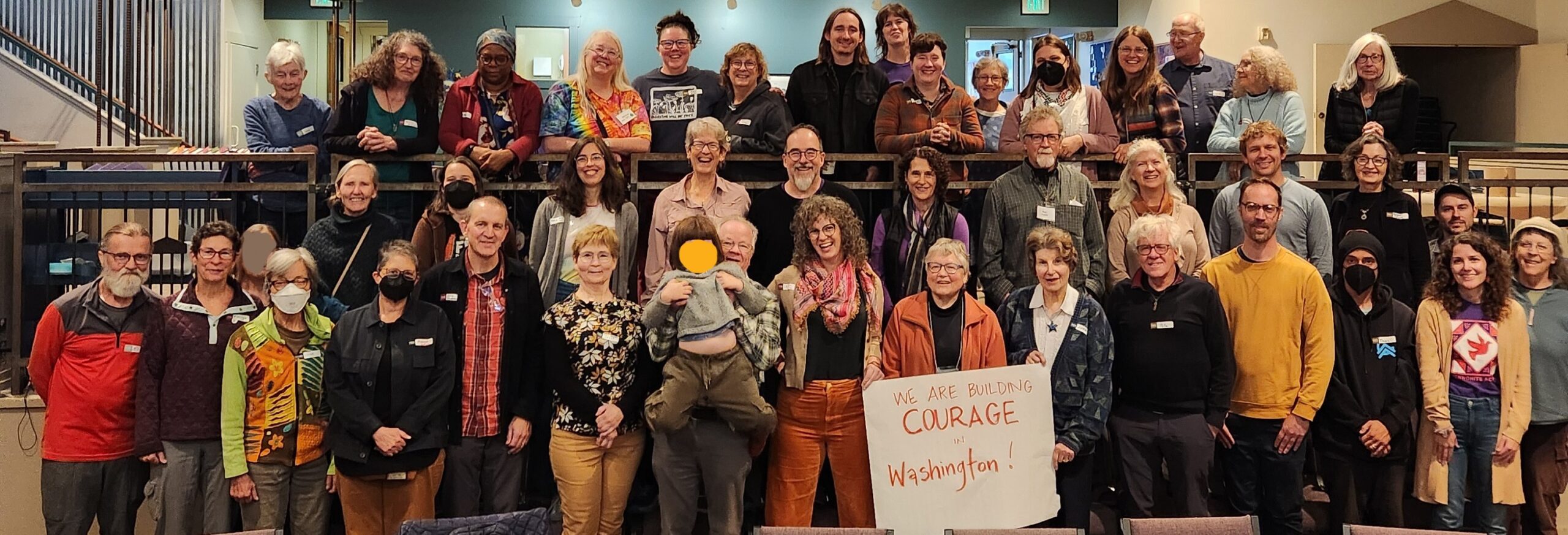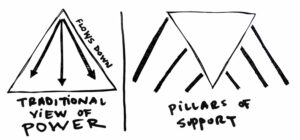
Building Courage for Non-Cooperation
This presentation and information are borrowed from Mennonite Action and Freedom Trainers
Jesus’ parable from Matthew 25 is a reminder of the call to Jesus’ followers to offer care, compassion and justice to those most vulnerable. His ministry demonstrated his own commitment to these values even to the point of his death at the hands of an occupying government. Paul’s letter to Timothy is a reminder that while the church is faced with challenges in following the call and mandate to justice, we have within us a spirit of courage, giving us power in community. The Spirit is with us, empowering us to act boldly.
When our governments are misusing power and abusing citizens, we need to call on that courage to resist, to not cooperate. Governments – especially authoritarian governments – are only as strong as the people and pillars that hold them up.
One way to visualize our power and our responsibility as Mennonites and Christians is to envision ourselves as part of a pillar – the “Faith Pillar” – among others like academia, unions, business, military etc. We have connections within and outside of the church and have the potential to ask others to take action and remove their support for the system at key moments.
The key is to organize and think about what are the red line moments that will spur us to non-cooperation. These are the key moments where something outrageous, egregious happens and we attempt to do all we can to stop things from getting worse. In fact, red lines are happening frequently. Mennonite Action was formed in response to a red line: the genocide in Gaza.
It can also be a cycle: one red line is crossed, things get worse, we feel helpless. Another line gets crossed. So how do we stop this cycle? We organize ourselves and with people around us to have the power to stop things from going further in the future. We do this by:
- Anticipating red lines locally and nationally
- Aligning allies and activating allies
- Practicing action
- Building support structures
The next time there is an incident of injustice or provocation, we don’t want to feel helpless. We want our response to be stronger. We want to feel more prepared. We want to be more courageous. And when we act out of preparation and discipline, rather than out of reaction, we can stay more grounded in our values and in our courage. Some examples might be:
- Ask our churches to support members to accompany immigrants to immigration hearings
- Starting a church mutual aid fund
- Training church de-escalators
- Mapping out key relationships in your local community
Example: Montgomery bus boycott – lasted over a year – ready to meet the moment (Rosa Parks) with boycott (Noncooperation) mutual aid, media etc. These efforts took training, careful planning, discerning of roles, preparation, and practice. We have one scenario to help us think about the resources already in our midst and how we might prepare to respond.
Organize Your Community to Non-Cooperate
Scenario:
With ICE’s 400% increase in budget, they ramp up their targeting of day laborers, and Home Depot is hit with a raid. The day laborers at Casa Latina (a day labor center in Central Seattle) are seriously concerned that they will be targeted this week, and call on the Church Council of Greater Seattle and faith communities to be in solidarity with them through urgent protection of the day laborers and nonviolent resistance to ICE’s cruelty. The Church Council calls an emergency community meeting with area churches and justice partners to plan for the protection of the Casa Latina, solidarity actions, and care for the workers and their families.
You and those gathered at the meeting decide to think about how you might noncooperate and support others to noncooperate with ICE…what do you do?
Note: If you live outside of Seattle, consider this scenario for a Day Laborer Center near you, or your closest Home Depot where day laborers gather each morning seeking work.
Here’s some info about what you know about who is at the emergency meeting:
- Three concerned day laborers and leaders from Casa Latina are at the meeting.
- Three people present are skilled de-escalators.
- Five participants present are bilingual Spanish- and English-speakers.
- Two participants volunteer with the Food Bank at St Mary’s near to Casa Latina.
- One participant in the group is a teacher at the local elementary school and a member of the teacher’s union.
- Two participants in the group are green card holders.
- A City Council member and police officer are present at the meeting (and Seattle is a sanctuary city that has committed to not assist ICE).
- Four participants from your church are there who have learned action planning skills by participating in Mennonite Action and other grassroots movements.
- You don’t know info about the other participants, but maybe you could find out?
Discussion Prompts:
- How will you learn more about which participants have connections to different communities? How will you learn about the different skills they hold?
- What are ways that you could imagine your particular church, community, or organization participating in noncooperation, or supporting others to noncooperate with ICE? Maybe you aren’t a leader – maybe you’re taking on a specific piece, organizing a specific group of people, or holding a specific role.
- What structures could be set up to support your church or community to noncooperate? What would your specific role in setting this structure up be?
—

